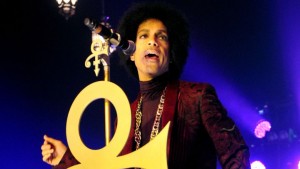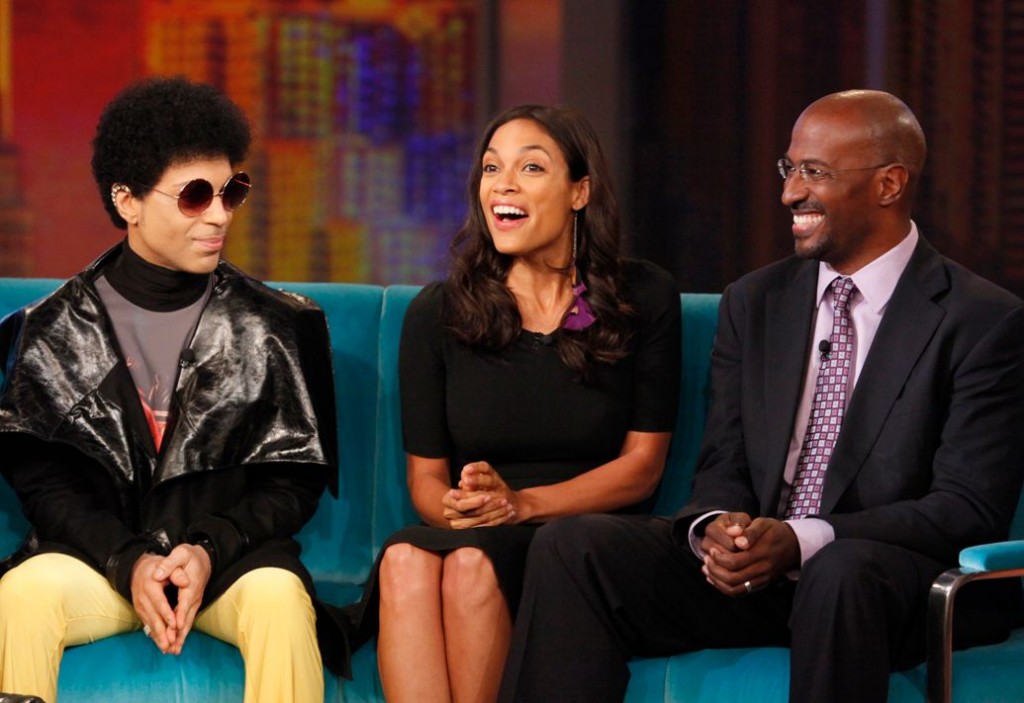
It began with an anonymous check about 10 years ago. Environmental and human rights activist Van Jones was working on George W. Bush’s Green Jobs Act when he received a $50,000 donation and no name attached to it. “I promptly returned it,” he recalls. “I’m not taking anonymous checks for $50,000. It could be from anybody.” But then someone sent it back, and he returned it again.
Eventually Jones received a call from a rep for the donor: “I cannot tell you who the money is coming from, but his favorite color is purple.” Jones laughs. “I said, ‘Well, now you’ve got another problem, because now I’m not going to cash the check, I’m going to frame it.'” The story got back to the man who wrote the check, Prince, who found it so funny he called Jones up and befriended him.
That’s when Jones learned about Prince’s secret other gig: philanthropist. Since Prince’s death last Thursday, Jones has learned just how involved Prince was in philanthropic causes. In recent years, the artist – who worked with Jones on the organization Green for All, which creates green jobs in disadvantaged communities, and #YesWeCode, an organization that educates urban youth about technology – worked to raise awareness for movements like Black Lives Matter and sent money to the family of Trayvon Martin. Prince’s ex-wife, Manuela Testolini, met him through doing philanthropic work for his foundation and he encouraged her to start her own charity; she’s now building a school with her In a Perfect World organization in his memory. In a statement after his death, she described him as a “fierce philanthropist.”
The artist had become interested in Jones’ Green Jobs initiative when he saw news reports about young people of color putting up solar panels in Oakland and wanted to help. “He liked the fact that I was bringing it to the hood,” Jones tells Rolling Stone. “He just thought it was an amazing way to create jobs. He was always about economic independence.”
It wasn’t easy to define Prince’s politics. He was very concerned about poor people and black people, but he also believed in economic empowerment and uplift. “He wasn’t red, and he wasn’t blue,” Jones says. “He was purple. With one sentence, you would think he was Republican, because he’d be talking about the economy, and with the next, you’d think he’s a liberal Democrat, because he was talking about the need to fight racism. It was a flow of insights and inspiration. At the end of the day, it was purple politically.”
Asked if certain causes appealed to Prince more than others, Jones just laughs. “You’re asking if there was some pattern to something that Prince did?” he says. “I think my phone broke up. He was completely unpredictable.”
He then focuses on Prince’s mission. “His cause is humanity,” Jones says. “He cares a lot about people. Nobody went to a Prince concert and said, ‘I don’t belong here. I’m not black. I’m not white. I’m not cool. I’m not straight. I’m not whatever.’ His cause was empowering and uplifting people. That didn’t stop when he walked off the stage or out of the studio. It was a current of genius trying to move the human heart.”
As an example, Jones explains how the murder of Trayvon Martin inspired #YesWeCode. While people were debating whether the 17-year-old was a “thug or a victim” and whether George Zimmerman was a “racist or a hero,” in Jones’ words, Prince zeroed in on the hoodie Martin wore. “He said, ‘Hold on a second: If a black kid wears a hoodie, you say he’s a thug, and if a white kid wears a hoodie, you say it’s Mark Zuckerberg. Why is that?'” Jones recalls. “And then of course, I say, ‘Because of racism.’ And Prince goes, ‘Well, maybe. Or maybe we just haven’t produced enough black Mark Zuckerbergs. Why don’t we focus on that?’ Complete genius.
“He’s trying to create something that everybody can dance to,” he continues. “Politically, poor kids putting up solar panels? Everybody can dance to that. Kids wearing hoodies in the hood, but they’re learning how to upload apps, rather than download them? Everybody can dance to that.”
Prince also helped bring attention to #YesWeCode, and break down racial barriers in the tech community. “We did hackathons across the country,” Jones says. “We got Essence magazine to do the first hackathon in any major black gathering. All that is because of him.”
In a recent interview with CNN, Jones suggested that many of Prince’s pop-up concerts – such as the one he played last year in Baltimore in the wake of the Freddie Gray riots – were a cover for him to meet with politicians. While he was at such events, he would try to bring opposing sides together.
“A lot of times, he would do these tricky things, where people [in power] are coming because they think or assume or hope they’re going to meet him,” Jones says. “And then they get stuck in a green room for an hour with their worst enemy and wind up being friends. And they never met Prince in their life. He would do stuff like that to people all the time.”
In the days since Prince’s death, Jones says he now realized that the artist had reached out to hundreds of people with the aim of helping. He’d read about a negative event in the news (“He was a news nerd,” Jones says) and then try and figure out a way to do something about it. “He would mobilize his network very quietly to weigh in on stuff,” Jones says. “I didn’t understand until he passed away how few people knew that.”
He figures Prince kept the breadth of his philanthropy secret because of his faith and because flaunting one’s good works would be gauche. “He had a level of pure genius that he expressed through music, and people think, ‘Therefore he’s a musical genius,'” Jones says. “No, he was a genius who expressed his genius through music, because he could express his genius through anything he wanted to.”
“If he wanted to be a politician, he would have been king of the earth.”
Even if it wasn’t readily apparent to his fans, social causes were an interest that permeated Prince’s whole being, Jones says. “I think people misinterpreted him as being cool for cool’s sake, or mysterious for mystery’s sake, or aloof for its own sake,” he says. “But that aspect of his personality was him trying to understand the world, the universe, God, people, everything. He was trying to understand the world so he could change it. He wasn’t trying to change it so he could be famous or rich, he’d already achieved that by the time he was 20. So what do you do for the next 30-plus years?
“Just like he had a whole roster of musicians, he had a whole roster of intellectuals, a whole roster of political activists, a whole roster of change-makers,” Jones continues. “Just like he was a bandleader on the musical side, he was a bandleader on the social side.”
It’s just something that came natural to Prince. “He just had a lot of insight into people,” Jones says. “If he wanted to be a politician, he would have been king of the earth.”
Prince died on April 21st, 2016.

